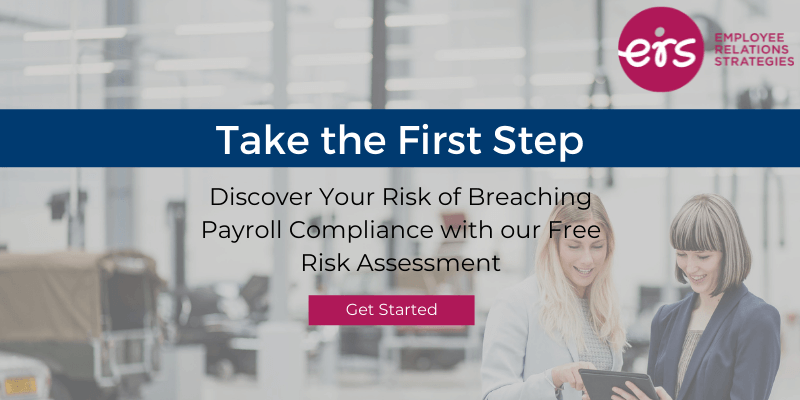Payroll Compliance seems like a simple issue.
Pay your employees on time!
But it is much more complex and complicated than it appears to be at face value.
You’ve likely seen the recent headlines about companies and organisations like Bunnings, Woolworths, Coles, the ABC and even many of our universities shorting employees on their pay cheques. Even McDonalds has been accused of not giving employees their rest breaks.
Sure, sometimes these shocking assaults on employee entitlements are intentional, or at the very least, grossly negligent. But very often, payroll non-compliance is a matter of oversight, misinterpretation, your HR department being uneducated or under-educated, or the wrong setup or programming of your Time and Attendance system.
Sadly, a lack of knowledge or oversight will not excuse your company once an employee or the Fair Work Ombudsman decides to hold you accountable in the spotlight of the media and/or with legal action.
Payroll Compliance is a critical issue to be taken seriously.
It can make the difference between happy, productive employees and the alternative of disgruntled workers that complain to the media and Fair Work about underpayments. It can mean a strong, successful, thriving company versus one that scrapes to get by, barely able to pay its staff correctly.
ER Strategies is here to help. With this expert guide to payroll compliance that you are reading, you can be sure you are not only on the straight and narrow when it comes to all of your payroll issues, but you also now have a resource to turn to for help.
Contact ER Strategies at any time for help with Payroll Compliance or any other workplace issues. We are here to support your business.
Without further ado, let’s dive right in.
All You Need to Know about Modern Awards
A modern award sets out terms of employment in addition to the National Employment Standards. It provides information on employee entitlements such as:
- Pay
- Hours of work
- Rosters
- Breaks
- Allowances
- Penalty rates
- Overtime
A modern award applies to the great majority of employees covered by our national workplace relations system. Awards are generally either industry or occupation-based and apply to both the employer and employees who perform work covered by the award.
As of right now, Australia has around 120 modern awards of general application. Most modern awards relate to particular industries or occupations. There are, however, a select few enterprises and states referencing public sector awards that cover specific employers and their employees only.
An employee’s minimum entitlements within the national system are set by a combination of both their modern award and the National Employment Standards (NES).
Modern awards are meant to be reviewed every four years by the Fair Work Commission to determine what changes may need to be made, although sometimes these reviews have dragged on for more than 4 years. These reviews include considerations such as annual leave, apprenticeship conditions, family-friendly work arrangements, public holidays, and more.
Small and medium-sized businesses which are non-compliant with applicable modern awards can be subject to hefty fines and penalties. The obligation to comply falls heavily on the business owners, executives and board members, who are accountable to the law for non-compliance, including criminal liability in some states and territories.
If you wonder if your business and employees are subject to modern awards and don’t know where to begin, click here.
If you need help to identify which award covers your employees, take a look at another blog here, or get in contact with ER Strategies and we’ll let you know how we can assist.

What Is the Annual Wage Review?
Each year, the Fair Work Commission reviews the national minimum wage for Australian workers and also the modern award wages. The Commission convenes an expert panel that considers many factors and evaluates statements and submissions made by federal and state bodies and employers and employees.
The Annual Wage Review typically takes place from March to June, and the commission undergoes an evaluation process that includes:
- written submissions from interested organisations and individuals,
- consultations before the Expert Panel,
- research commissioned by the expert panel,
- minimum wages in modern awards and transitional instruments, and
- the national minimum wage order from the previous annual wage review.
The Commission is obligated by law to ensure every voice is heard, every submission is taken into consideration, and that the public has access to all submissions. Hence, there is complete transparency around the entire process. The same requirements apply to research done by the Commission. The public must be included in all information that relates to the final decision on the Annual Wage Review.
The expert panel charged with conducting the Annual Wage Review includes the panel President, three full-time members of the Commission, and three part-time members. The part-time members only focus on the Review, and all participants in the expert panel must be educated in the areas involved, such as workplace relations, economics, social policy, business, industry or commerce. They must, indeed, be experts.
It is incumbent upon businesses to stay abreast of all changes each year and any increases awarded by the FWC.
For more information, click here.
You can also contact ER Strategies for help understanding and implementing award wage changes. We have a team of experts who remain consistently educated around the Annual Wage Review updates. Our Guide on the Annual Wage Review covers everything an employer will need to know, make sure to check it out!

Penalty Rates and Allowances
Most employees in Australia, whether covered under a modern award or an enterprise agreement, are entitled to extra pay, or “penalty rates,” when working outside of the standard Monday through Friday work hours. Penalty rates can apply in various instances:
- Saturdays
- Sundays
- Evenings
- Holidays
- Late nights
- Early mornings
Further, extra pay is also often granted as an “allowance” to employees who have to work in particularly difficult conditions (e.g. confined spaces, dirty work, etc), use their own tools, or perform certain tasks that require a unique skill, such as supervisory allowances.
The specific penalty rates or allowances an employee must be paid is based on the award, agreement, or other industrial instruments in place, but there can also be other workplace arrangements that affect employee pay, including salary agreements, employment contracts, or individual flexibility arrangements (IFAs).
However, it must be remembered that employees are entitled to their national minimum entitlements under the law, regardless of any workplace agreements that fall below these minimum standards, including that an enterprise agreement can never have a base rate below the award rate for that classification.
Penalty rates and allowances under awards and agreements can include an increase in pay, from 150% of standard pay and up to 200%, and even 250% for public holidays. Enterprise agreements can sometimes have even higher rates than under awards.
There are, however, very limited situations under which an employer can cease to pay an employee, including where an employee has been stood down because there is no useful work for the employee due to:
- events beyond the control of the employer, such as a strike, machinery breakdown or disruption to electricity;
- events such as severe and inclement weather where it is unreasonable or unsafe to continue work, or
- when a natural disaster affects a business.
Businesses are obligated to honour penalty rates and allowances and can be in danger of underpaying employees by failing to meet this obligation.
For help understanding proper wage schedules for your employees, you can refer to our Wage Schedule.
Or read more about allowances and penalties here.

Record-Keeping Obligations
Every Australian business is required to keep legible and complete records about each of their employees, including full name, pay rate, type and length of employment, amongst others. A Fair Work Ombudsman Inspector may request access to these records at any time and should be able to review records going back up to seven years. This requirement remains true even in the event of a business transfer or takeover.
The benefits of record keeping include:
- Keeping track of the financial health of your business, so you can make proper adjustments and projections.
- Meeting your tax and superannuation obligations.
- Managing your profits, revenues, and cashflow.
- Demonstrating your financial position to banks, lenders, and corporate partners.
All businesses, according to the Australian Taxation Office, must keep records that are not altered in any way for at least five years, that can also be shown to the ATO upon request.
Companies can track their records in a number of ways, using various digital platforms and applications. The ATO recommends using electronic record keeping whenever possible, as the Tax Office itself is increasingly digital for checking tax and super obligations.
Keeping electronic records also allows you to have a better overview of your staffing and employee resources.
Your records should be stored in a secure place, and once you have an electronic version, your paper records no longer need to be stored.
Records must be stored on a computer or device that:
- you have access to (including all passwords),
- is backed up in case of computer failure, and
- allows you to control the information that is processed, entered and sent.
If you choose an electronic record keeping system, the benefits include occupying less physical storage space than a paper-based system, automatic calculation of amounts, easy to generate reports, and easy-to-back-up records, to keep away from fire or theft.
Accounting software is also an option for those willing to invest in accounting packages to download onto your company system. You could also opt for a web-based bookkeeping system. Both choices will allow you to store human resources data, as well as:
- Record transactions,
- Calculate Goods and Services Tax,
- Update ledgers,
- Prepare financial statements, and
- Generate invoices.
Whichever you decide to use, it is crucial you ensure you have well-kept records for your employees. Businesses without proper record keeping can be found to be in breach of our national employment laws.
We have created a quick record keeping run-down on everything that your business should be recording. We also go more in depth on the benefits of solid record keeping and the consequences of failing to utilise record keeping procedures in a business. Take a look at it here!

What Are Underpayments?
Underpayments occur with alarming frequency. Employers pay employees less than the employees are due based on minimum wage, penalty rates, and allowance requirements. Underpayments can land businesses in serious trouble with the federal government and can lead to negative front-page headlines, and now key business executives can face criminal sanctions and even prison.
In the last financial year 2020 alone, the Fair Work Ombudsman (FWO) recovered almost $150 million for workers, five times that of the $30 million recovered just three years earlier. This news is evidence that wage theft is not only a serious problem, but also one that is on the rise.
Large corporations – including Woolworths, Coles, Bunnings and the ABC – agricultural farms, public bodies (such as the National Library) and even universities, have been found to be in breach of their legal obligations to pay fair and full compensation. ER Strategies has found in our own internal audits we perform for companies (both large and small) precisely what the FWO has found – most of this wage theft is inadvertent. It is almost always a case of improper accounting and disorganised payroll and workplace relations processes, systems and expertise.
Of course, there are many smaller businesses that do indeed blatantly disregard the law and fail to pay their workers a fair wage, making it not only a systemic problem, but even becomes part of their business model.
To avoid these dire consequences, it is incumbent upon employers to ensure each employee is paid properly. This, however, can be a troubling situation as most employers do not underpay employees on purpose. Indeed, quite often, employers rely on ‘Time and Attendance’ systems to keep track of proper pay, and it is often these systems that fail the employer.
To remedy this situation, ER Strategies has expert consultants on staff who are available to our business clients. We offer comprehensive payroll auditing and advice, which will help keep your records and your systems on track and up-to-date. If want to read more about underpayments click here.
Wage Theft in Australia
We have laws in place in Australia to prevent employers from incorrectly withholding any due payments (whether intentionally or unintentionally) to an employee. Violating these laws can in some states and territories result in prison time for any employer who knowingly does not pay employee the wages to which they are entitled. These laws also apply to any employer who has falsified employee records, in order to make it appear as though employees have been paid correctly.
Businesses must be on high alert to avoid wage theft or any appearance thereof.
The wage theft laws have come into place because of the ongoing prevalence in Australian workplaces and the media of underpayment issues. For far too long, limited protections were in place for workers, and no systems stood to hold businesses accountable for being non-compliant.
Victorian ‘Wage Theft’ laws impose criminal sanctions for employers who:
- Dishonestly withhold all or part of an employee’s entitlements.
- Falsify an employee’s entitlement records in order to obtain a financial advantage for the employer or another person or to conceal a previously obtained financial advantage.
- Fail to properly keep a record of employee entitlements in order to obtain financial advantage for the employer or another person or to conceal a previously obtained financial advantage.
Responsible parties are not only the ultimate employer but also staff within the company who are engaged in this falsification of records and withholding of pay entitlements.
Any individual considered an “Officer” within the company, one who has key decision-making capabilities, can be charged under these criminal laws.
An “Officer” can include:
- A company director
- An officeholder
- A partner
- Any other person who has the capacity to significantly affect the company’s finances.
In Victoria, the Act established a governing body of oversight called the Wage Inspectorate, whose job it is to:
- Inform and educate the public on the Act,
- Monitor and promote compliance with the Act,
- Investigate potential offences, and
- Bring criminal proceedings when offences are committed.
It is illegal to attempt to hide information from or obstruct the work or investigations of the Wage Inspectorate.
The Act itself does not impose any new standards or regulations. It is merely in place to uphold the existing standards and regulations and bring to account those who fail to comply.
ER Strategies has a proven Employment Compliance Framework in place to keep businesses on track and out of trouble with the law.
Now more than ever, employers must pay close attention to compliance issues. ER Strategies is here to help. Want to find out more about wage theft and how to prevent it in your business? Click here.

Common Causes of Payroll Errors
There are many reasons an employer may be Payroll non-compliant, and it is typically not due to malicious intent or even flawed attention to detail. Usually, companies have systems in place, and their HR or Finance departments try hard to stay on top of their compliance obligations.
But laws change fast, systems fail, and HR and Finance departments are not always able to stay on top of critical updates.
It could be a matter of incorrect base rates being entered into your system. Perhaps a shift change occurred, and the person in charge of recording it forgot or missed a step.
Some other common causes of payroll errors include:
- Using out of date technology to run your payroll.
- Not recognising payroll as both a finance and HR function.
- Failing to stay up-to-date with changes in legislation.
- Misinterpretation of the award.
Australian payroll is complex, and with the new Act in place and an entire body of government now established to enforce the laws, businesses could find themselves sliding down the slippery slope from mistakes, to face hefty fines and even total loss of the employing entity if the breaches are sufficiently serious and widespread.
One simple strategy to put into place now is to have a highly trained IR/ER expert who is not only educated with all critical knowledge and skills but also stays up to date with changes. Even better, if that person is non-biased and is an external partner.
In addition to the legal quagmire a company may find itself in over payroll errors, there is also employee frustration to take into consideration. Unhappy, underpaid employees make for a dismal workplace and can bring down the entire working environment and morale of your company. One unhappy employee alone can sabotage, whether intentionally or not, myriad functions of your business. And that unhappiness tends to be contagious.
Taking proper care of payroll and ensuring you are in complete compliance, will help ensure a more successful business, both in the immediate future and in the long run.
ER Strategies not only understands all of the common causes of payroll errors, we also have strategies in place to prevent them and help keep you compliant.
Contact us today for all your workplace compliance needs.
Are Payroll Audits the Solution?
Well yes, sometimes they are. At ER Strategies, we can act as your payroll auditors and review all of your records and payroll data to ensure you are in compliance with your obligations. We act as a sort of mock Inspector from the FWO and catch any discrepancies, errors, or problems before they get you into trouble.
Regular payroll audits can save you time, energy, and a ton of money in fines and legal defence costs, if it comes down to that.
A pre-emptive payroll audit provides you with all the information you need to get on track with your payroll and keep your business functioning at its highest possible level. Since the changes to the Fair Work Act were passed in 2017, it is now permissible for the Fair Work Ombudsman to send auditors out for periodic audits of your records to verify your compliance.
It is a smart strategy to have a third party come into your business before that inevitability occurs and to help you get your entire organisation under control in terms of its proper payroll compliance and record keeping obligations. In most cases, any errors you may have made are likely due to a lack of knowledge or training, and we can help remedy that, getting you all the information you need and pointing you in the right direction for proper training and education. Want to find out more about the benefits payroll audits can bring to your business? Click here.
ER Strategies has the reputation of helping businesses create and foster a welcoming and hospitable work environment. Trust us to be your partners in compliance as well.
Contact ER Strategies Today
ER Strategies is your resource for workplace compliance. Our primary goal is to partner with you to foster a harmonious work environment for all people in your organsiation. We have witnessed first hand the productivity and prosperity possible in a well-organised, high functioning, communicative workplace, and we exist to help guide businesses in that positive direction. With years of experience and expertise on workplace compliance from Payroll to Industrial Relations, ER Strategies is eager to get to work with you on growing a strong and successful business through attention to detail and unimpeachable integrity.
Contact ER Strategies today for all your payroll compliance and other workplace compliance needs.


